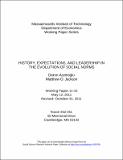History, Expectations, and Leadership in the Evolution of Social Norms
Author(s)
Acemoglu, Daron; Jackson, Matthew
DownloadAcemoglu11-10.pdf (465.0Kb)
Terms of use
Metadata
Show full item recordAbstract
We study the evolution of the social norm of “cooperation” in a dynamic environment. Each agent lives for two periods and interacts with agents from the previous and next generations via a coordination game. Social norms emerge as patterns of behavior that are stable in part due to agents’ interpretations of private information about the past, which are influenced by occasional past behaviors that are commonly observed. We first characterize the (extreme) cases under which history completely drives equilibrium play, leading to a social norm of high or low cooperation. In intermediate cases, the impact of history is potentially countered by occasional “prominent” agents, whose actions are visible by all future agents, and who can leverage their greater visibility to influence expectations of future agents and overturn social norms of low cooperation. We also show that in equilibria not completely driven by history, there is a pattern of “reversion” whereby play starting with high (low) cooperation reverts toward lower (higher) cooperation.
Description
August 31, 2013 revision to this paper is available at http://hdl.handle.net/1721.1/81956.
Date issued
2011-11-05Publisher
Cambridge, MA: Department of Economics, Massachusetts Institute of Technology
Series/Report no.
Working paper, Massachusetts Institute of Technology. Dept. of Economics;11-10
Keywords
cooperation, coordination, expectations, history, leadership, overlapping generations, repeated games, social norms
Collections
The following license files are associated with this item: